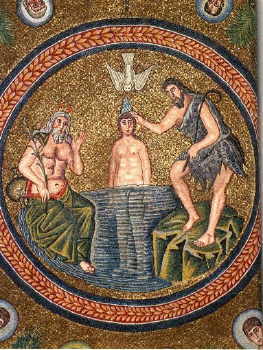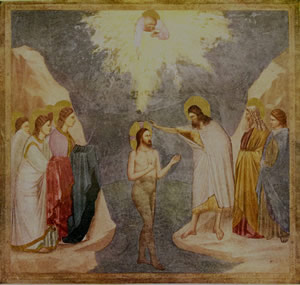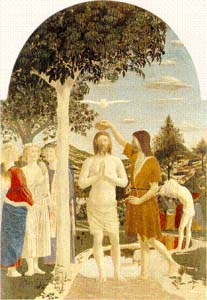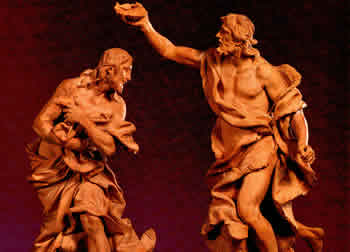An "Acute Embarrassment"?
The Baptism of Jesus
For Sunday January 9, 2011
Lectionary Readings (Revised Common Lectionary, Year A)
Isaiah 42:1–9
Psalm 29
Acts 10:34–43
Matthew 3:13–17
After living in total obscurity his entire life, in his late twenties Jesus left his family in Nazareth and joined the movement of his eccentric cousin John. Jesus might have even submitted himself to John as a disciple to a mentor. Some scholars think that John was part of the apocalyptic Jewish sect of Essenes who opposed the temple in Jerusalem. At least this much is clear — John the Baptizer was a prophet of radical dissent, so much so that his detractors said that he had a demon (Luke 7:33).
Whereas John's father had been part of the religious establishment as a priest in the Jerusalem temple, John fled the comforts and corruptions of the city for the loneliness of the desert. There he dressed in animal skins, ate insects and wild honey, preached, and baptized. Living on the margins of society, both literally and figuratively, he preached "a baptism of repentance for the forgiveness of sins" (Mark 1:4).
 |
Mosaic, baptistry in Ravenna, c. 500's. |
Borg characterizes John's message as an announcement of both "indictment and invitation." Contrary to what you might have expected from such an ascetic man with an austere message, the gospels say that people flocked to John. Even twenty years later in far away Ephesus (1,000 miles by land or 600 miles by sea), people submitted to the baptism of John (Acts 19:3).
John's preaching in the Judean desert and baptizing in the Jordan river confronted both the religious and the political powers of his day. About six months after John emerged from the desert like some scraggly lunatic and baptized Jesus, he was beheaded at the whim of Herod the tetrarch, who at a dinner party capitulated to the sadistic demand of his girlfriend's daughter. John was the forerunner of Jesus, but he was also a forth-teller to Herod, having rebuked Herod for sleeping with his brother's wife (Mark 6:14–29). But as with many perverse politicians, Herod had his way with him who had spoken truth to power, so John was murdered.
The temple establishment in Jerusalem, which exercised a gate-keeper monopoly on mediating God's grace to people, didn't like him preaching from the periphery either. John castigated these religious authorities as a "brood of vipers" (in one translation, "snake bastards"). The religious experts, said Jesus, spurned John's call to baptismal repentance, and in so doing "rejected God's purpose for themselves" (Luke 7:30).
The prophetic word of God from John the Baptist, then, did not originate with the state powers or the religious establishment, nor did it find a receptive audience with them. Instead of cooperation, accommodation, or resignation, John challenged these religious and political powers with his anti-establishment message of "protest and renewal." By joining John the Baptizer's fringe movement, Jesus did likewise (Borg).
 |
Fresco by Giotto, c. 1300. |
Then comes a shock — Jesus himself asks to be baptized by John. With some important stylistic differences, all four gospels tell the story of Jesus's baptism by John: "When all the people were being baptized, Jesus was baptized too. And as he was praying, heaven was opened and the Holy Spirit descended on him in bodily form like a dove. And a voice came from heaven: 'You are my Son, whom I love; with you I am well pleased'" (Luke 3:21–22 = Mark 1:9–11= Matthew 3:13–17; John 1:29–34).
After his radical rupture with his family and conventional society by identifying with the desert troublemaker, to the point of submitting to his baptism, Jesus's own family tried to apprehend him. The village of Nazareth tried to kill him as a deranged crackpot (cf. Mark 3:21, Luke 4:29, John 7:5).
Why did Jesus the greater submit to baptism "for the forgiveness of sin" by John the lesser? Did he need to repent of his own sins? The earliest witnesses of his baptism asked this question, because in Matthew's gospel John the Baptizer tried to deter Jesus: "Why do you come to me? I need to be baptized by you!" In other words, John insists that Jesus was not getting baptized for his own sins. Crossan argues that there was an "acute embarrassment" about Jesus's baptism on the part of the gospel writers.
 |
Painting by Pierro della Francesca, 1445. |
Even a hundred years after the event, Jesus's baptism made some Christians feel uneasy. In the non-canonical Gospel of the Hebrews (c. 80–150 AD), Jesus denies that he needs to repent. He seems to get baptized to please his mother: "The mother of the Lord and his brothers said to him, 'John the Baptist baptizes for the forgiveness of sins; let us go and be baptized by him.' But he said to them, 'In what way have I sinned that I should go and be baptized by him? Unless, perhaps, what I have just said is a sin of ignorance.'” Others have suggested that Jesus set an example for us, that just as he was baptized, we too should be baptized.
We get some clues to this question if we back track to the beginning of Matthew. On page one of his gospel Matthew lists forty-two men in Jesus's genealogy, then four women with unsavory pasts. Tamar was widowed twice, then became a victim of incest when her father-in-law Judah abused her as a prostitute (Genesis 38). Rahab was a foreigner and a whore who protected the Hebrew spies by lying. Ruth was a foreigner and a widow, while Bathsheba was the object of David's adulterous passion and murderous cover-up (Matthew 1:1–17). These four women were forbears of Jesus.
On page two, Matthew describes the birth of Jesus through five disturbing dreams. He pits Herod "the king of the Jews" against Jesus "the king of the Jews." The pagan magi worship Jesus, whereas Herod tries to kill Jesus by slaughtering the baby boys of Bethlehem. Jesus escapes to Egypt, the sworn and symbolic enemy of Israel, and finds refuge there.
Jesus's baptism inaugurated his public ministry by identifying with "the whole Judean countryside and all the people of Jerusalem." He allied himself with the faults and failures, the pains and problems, of all the broken people who had flocked to the Jordan River. By wading into the waters with them he took his place beside us and among us. Not long into his public mission, the sanctimonious religious leaders derided Jesus as a "friend of gluttons and sinners." They were right about that.
 |
Sculpture by Alessandro Algardi, 1644-1645. |
With his baptism, Jesus openly and decisively stands with me in my fears and anxieties. He intentionally took sides with people in their neediness, and declared that God was biased in their favor: "For we do not have a high priest who is unable to sympathize with our weaknesses, but we have one who has been tempted in every way, just as we are — yet was without sin. Let us then approach the throne of grace with confidence, so that we may receive mercy and find grace to help in our time of need” (Hebrews 4:15–16, NIV). God's abundant mercy, Jesus declared, is available directly and immediately to every person; it's not the private preserve doled out by the temple establishment in Jerusalem.
Jesus's baptismal solidarity with broken people was vividly confirmed by God's affirmation and empowerment. Still wet with water after his cousin had plunged him beneath the Jordan River, Jesus heard a voice and saw a vision — the declaration of God the Father that Jesus was his beloved son, and the descent of God the Spirit in the form of a dove. The vision and the voice punctuated the baptismal event. They signaled the meaning, the message and the mission of Jesus as he went public after thirty years of invisibility — that by the power of the Spirit, the Son of God embodied his Father's unconditional embrace of all people everywhere.
For further reflection:
* Why do you think Jesus submitted himself to John's baptism?
* Cf. John Howard Yoder on John the Baptist: "To repent is not to feel bad but to think differently."
* Cf. Isaiah 42:3: "A bruised reed he will not break/and a smoldering wick he will not snuff out."
* Consider the functions of water to heal, cleanse, nourish, quench thirst, etc.
Image credits: (1, 2) Roanake College, baptism1.htm; (3) Roanoke College, baptism2.htm; and (4) Roanoke College, baptism4.htm.





